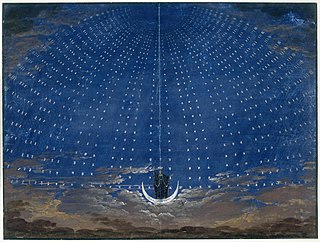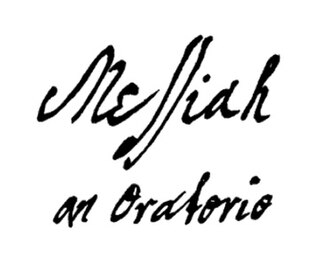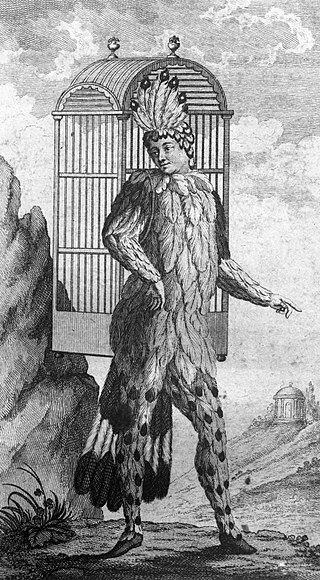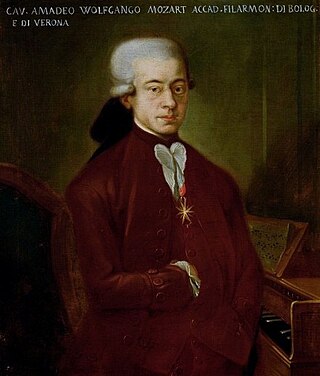Related Research Articles

The Magic Flute, K. 620, is an opera in two acts by Wolfgang Amadeus Mozart to a German libretto by Emanuel Schikaneder. The work is in the form of a Singspiel, a popular form during the time it was written that included both singing and spoken dialogue. The work premiered on 30 September 1791 at Schikaneder's theatre, the Freihaus-Theater auf der Wieden in Vienna, just two months before the composer's death. It was the last opera that Mozart composed. The opera was an outstanding success from its first performances, and remains a staple of the opera repertory to this day.

Messiah is an English-language oratorio composed in 1741 by George Frideric Handel. The text was compiled from the King James Bible and the Coverdale Psalter by Charles Jennens. It was first performed in Dublin on 13 April 1742 and received its London premiere a year later. After an initially modest public reception, the oratorio gained in popularity, eventually becoming one of the best-known and most frequently performed choral works in Western music.

Alceste, Wq. 37, is an opera by Christoph Willibald Gluck from 1767. The libretto was written by Ranieri de' Calzabigi and based on the play Alcestis by Euripides. The premiere took place on 26 December 1767 at the Burgtheater in Vienna.

Opera seria is an Italian musical term which refers to the noble and "serious" style of Italian opera that predominated in Europe from the 1710s to about 1770. The term itself was rarely used at the time and only attained common usage once opera seria was becoming unfashionable and beginning to be viewed as something of a historical genre. The popular rival to opera seria was opera buffa, the 'comic' opera that took its cue from the improvisatory commedia dell'arte. An opera seria had a historical or Biblical subject, whereas an opera buffa had a contemporary subject.

Der Schauspieldirektor, K. 486, is a comic singspiel by Wolfgang Amadeus Mozart, set to a German libretto by Gottlieb Stephanie, an Austrian Schauspieldirektor. Originally, it was written because of "the imperial command" of the Holy Roman Emperor Joseph II who had invited 80 guests to a private luncheon. It is regarded as "a parody on the vanity of singers", who argue over status and pay.

Rusalka, Op. 114, is an opera by Antonín Dvořák. His ninth opera (1900–1901), it became his most successful, frequenting the standard repertoire worldwide. Jaroslav Kvapil wrote the libretto on Karel Jaromír Erben's and Božena Němcová's fairy tales. The rusalka is a water sprite from Slavic mythology; it usually inhabits a lake or river.

Lo sposo deluso, ossia La rivalità di tre donne per un solo amante is a two-act opera buffa, K. 430, composed by Wolfgang Amadeus Mozart between 1783 and 1784. However, the opera was never completed and only a 20-minute fragment from act 1 exists.

L'oca del Cairo is an incomplete Italian opera buffa in three acts, begun by Wolfgang Amadeus Mozart in July 1783 but abandoned in October. The complete libretto by Giambattista Varesco remains. Mozart composed seven of the ten numbers of the first act, plus some recitative, as well a sketch for a further aria; the extant music amounts to about 45 minutes.

The Köchel catalogue is a catalogue of compositions by Wolfgang Amadeus Mozart, originally created by Ludwig Ritter von Köchel, in which the entries are abbreviated K. or KV. Its numbers reflect the ongoing task of compiling the chronology of Mozart's works, and provide a shorthand reference to the compositions. For example, according to Köchel's counting, Requiem in D minor is the 626th piece Mozart composed, thus is designated K. 626.

Emanuel Schikaneder was a German impresario, dramatist, actor, singer, and composer. He wrote the libretto of Wolfgang Amadeus Mozart's opera The Magic Flute and was the builder of the Theater an der Wien. Peter Branscombe called him "one of the most talented theatre men of his era". Aside from Mozart, he worked with Salieri, Haydn and Beethoven.

Stephen John Seymour Storace was an English composer of the Classical era, known primarily for his operas. His sister was the famous opera singer Nancy Storace.

La finta semplice, K. 51 (46a) is an opera buffa in three acts for seven voices and orchestra, composed in 1768 by then 12-year-old Wolfgang Amadeus Mozart. Young Mozart and his father Leopold were spending the year in Vienna, where Leopold was trying to establish his son as an opera composer. He was acting on a suggested request from the Emperor Joseph II that the young boy should write an opera.

Bampton Classical Opera is an opera company based in Bampton, Oxfordshire and founded in 1993. It specialises in the production of lesser known opera from the Classical period. Performances are always sung in English. Opera today called the company 'ambitious, innovative and imaginative'.

Teddy Tahu Rhodes is a New Zealand-born operatic baritone based in Australia. He has performed at opera houses in New Zealand, Australia, San Francisco, Houston, Dallas, Philadelphia, Washington, New York City and throughout Europe. Apart from many appearances in the standard repertoire, he has sung leading roles in Australian and world premieres. His recordings range from Baroque oratorios, operas, Lieder cycles to nursery rhymes and musical theatre. His album The Voice won the Fine Arts Award at the 2004 ARIA Music Awards.
Paul Anthony Griffiths is a British music critic, novelist and librettist. He is particularly noted for his writings on modern classical music and for having written the libretti for two 20th-century operas, Tan Dun's Marco Polo and Elliott Carter's What Next?.
Opera North is an opera company based at The Grand Theatre, Leeds, England. This article covers the period when the company's music director was Paul Daniel.
Rosa Mannion is a British operatic soprano who has sung leading roles both in the opera houses of the UK and Europe and in the recording studio. Although particularly known for her roles in the operas of Handel and Mozart, she sang a wide repertoire during her career including Violetta in La traviata and all the leading female roles in The Tales of Hoffmann.

The Magic Flute, an opera by Wolfgang Amadeus Mozart with libretto by Emanuel Schikaneder, was composed in 1791 and premiered to great success. It has been an important part of the operatic repertory ever since, and has inspired a great number of sequels, adaptations, novels, films, artwork, and musical compositions.

Gli sposi malcontenti is an opera buffa in 2 acts composed by Stephen Storace to an Italian libretto by Gaetano Brunati.
Chester Watson was an American bass-baritone singer who had an active performance career in operas and concerts from the late 1940s into the 1970s. He was particularly active as a performer in opera on American television with the NBC Opera Theatre. He also made appearances with several American opera companies, including the New York City Opera, the Lyric Opera of Chicago, and the Opera Society of Washington. He is best known for creating roles in the world premieres of several American operas, including the First Police Agent in Gian Carlo Menotti's The Consul (1950), Father Julien in Norman Dello Joio's The Trial at Rouen (1956), Palivec in Robert Kurka's The Good Soldier Schweik (1958), and Leonard Swett in Thomas Pasatieri's The Trial of Mary Lincoln (1972). He notably starred opposite Maria Callas as Goffredo in the American Opera Society's lauded 1959 production of Vincenzo Bellini's Il pirata, which was recorded for EMI Classics. On the concert stage he appeared frequently with the National Symphony Orchestra during the 1950s, and also made guest appearances as a soloist with other American symphonies like the New York Philharmonic.
References
- ↑ Paul Griffiths: words and music
- ↑ Leeks, Stuart, ed. (2003). Opera North @ 25. Leeds: Opera North.
- ↑ "These the gems of Heav'n", essay by Griffiths on Bampton Classical Opera's website
- ↑ Dunnett, Roderic (23 September 2002). "Waiting for Figaro: St John's, Smith Square, London" . The Independent . Archived from the original on 2022-06-18. Retrieved 31 March 2020..
- 1 2 Milnes, Rodney. Jewels in a setting. Opera , April 1991, Vol.42 No.4, p.382-384.
- ↑ On the opening night Banks was indisposed and acted the part on stage while his music was sung by Philip Sheffield from the pit.
- ↑ This synopsis and the following list of musical numbers are based on information in the programme for two preview performances which took place on 7 and 11 January 1991, at the Grand Theatre, Leeds.